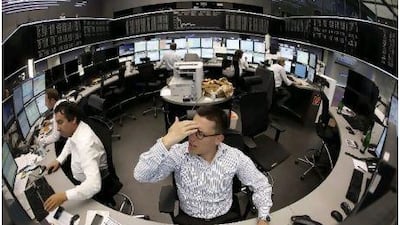Europe and Asia bore the brunt of the pain on global markets yesterday on a day that saw oil dip below US$80 a barrel and gold hit yet another record high.
But while European shares suffered their biggest two-day slump since 2008 after a painful Thursday for global indexes, the US held its ground in early trading.
Although the American markets fell at the opening, within the space of an hour the Dow Jones Industrial Average, the Nasdaq and Standard & Poor's 500 Index had all fought back into the green. At 6.20pm UAE time, the Dow Jones was up 0.23 per cent, the S&P 0.58 per cent and the Nasdaq 0.89 per cent.
Better-than-expected technology financials were cited for the muted optimism, though Hewlett-Packard tumbled 22 per cent, the most in 31 years, as UBS and Deutsche Bank cut their recommendations for the personal-computer maker.
But if the US was in the green, the reversal came after Europe had already taken a beating in yesterday's trading, spending the day firmly rooted in the red, with banking stocks hurting in particular. Within minutes of opening the FTSE in London fell below its significant 5,000-point barrier. Britain's leading shares dropped for a second day as recession fears rose, with banks falling on concerns about short-term lending stress.
At 5.30pm UAE time last night, the index was still 1.85 per cent down, frequently hovering around the 5,000 mark, sometimes creeping over but then slipping back under. Lloyds Banking Group led the banking sector lower, down 5.2 per cent to feature on the FTSE 100's biggest losers' list.
Both France's and Germany's main indexes also suffered, with the CAC down 2.29 per cent in Paris and the DAX falling further to 3.40 per cent in Frankfurt, as it seemed a short-selling ban imposed on some of Europe's stock markets last week had had little impact.
It might have been worse but for news that the UK had posted a smaller budget deficit last month than economists had forecast, as taxes on profits and a new bank levy boosted government revenue.
Prospects of a possible eurobond reared their head again as Olli Rehn, the EU's economic and monetary affairs commissioner, said the region might present draft legislation along with a report on the feasibility of common bonds.
The MSCI World Index of equities was down 1.25 per cent. It has lost nearly 15 per cent since the start of the month, and saw $1.4 trillion (Dh5.14tn) being wiped off valuations on Thursday and early on Friday - equivalent to the size of the Spanish economy.
"It's a creditworthiness issue," Stephen Wood, who helps to oversee $163 billion as the New York-based chief market strategist for Russell Investments, said:. "Europe has significant structural issues. There's lack of decision-making and structure. The market is forcing them to deal with it."
Before the European markets opened, it was Asia's turn to hurt with the MSCI Asia Pacific Index falling 3.2 per cent to 119.22 in Tokyo, set to erase all its gains since the start of last year. The gauge is also headed for a fourth straight week of loss. About 12 stocks dropped for each that advanced on the index yesteday. South Korea's Kospi Index sank 6.2 per cent, its biggest slump since late 2008.
Japan's Nikkei 225 Stock Averagelost 2.5 per cent, extending declines after an earthquake rattled buildings in Tokyo and triggered a tsunami alert for areas already affected by March's devastating earthquake and tsunami.
Australia's S&P/ASX 200 Index declined 3.5 per cent. Hong Kong's Hang Seng Index fell 3.1 per cent.
As stocks tumbled - and with it traders appetite for risk - so did the price of oil. Crude oil fell, heading for a fourth weekly decline, on concern that slower economic growth will reduce fuel demand. In New York, on the NYMEX index, oil fell below $80 a barrel for the first time in a week, though it rallied later.
"Sentiment has deteriorated significantly and swiftly over the past week," said John Kilduff, a partner at Again Capital, a New York-based hedge fund that focuses on energy. "We're on the cusp of a recessionary environment globally, which is putting a damper on the demand outlook and being reflected in the oil price."
Once again traders headed for the havens as gold hit the latest in a long line of record highs. It rose to above $1,860 an ounce.
"The drivers of the gold price at this point in time are all future expectations, such as more global liquidity and worsening of the status quo in global GDP," said Bayram Dincer, an analyst at LGT Capital Management in Switzerland.
"Either the gold market has adopted a very negative, and in our opinion not justifiable, negative, Armageddon-like view, or it is building an irrational bubble."

